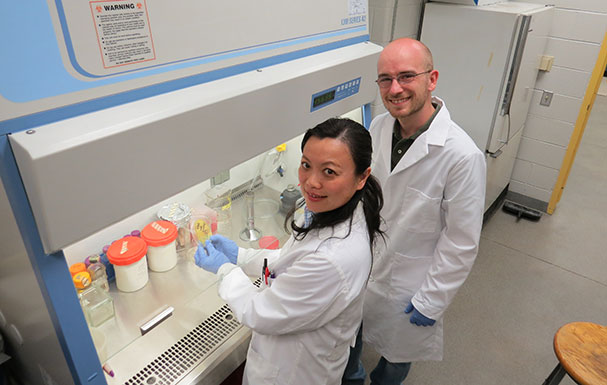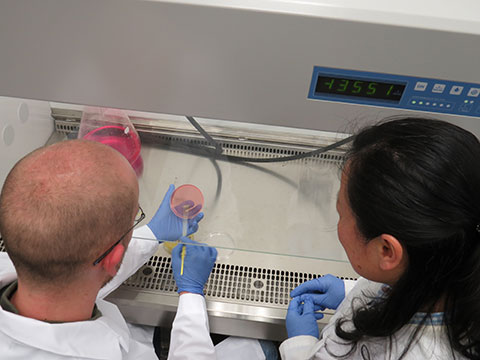
Nick Galambos is a senior biology major who plans to attend medical school and ultimately become a pathologist. In between classes, in the evenings, and often on weekends, he can be found in Xin Fan’s lab in Schmucker Science Center. Fan, an assistant professor of biology, asked Galambos to participate in a research study that investigates the prevalence of antibiotic resistant bacteria in area firehouses.
“We have developed a screening process for the gear that comes in direct contact with the firefighters,” says Galambos. “Firefighters interact with people in emergency situations; many of these people are injured and are susceptible to infection. This project is allowing for the presence of the antibiotic resistant bacteria to be quantified.”
Such information could lead to new gear cleaning protocols that could assist in keeping firefighters and those they help safe from possible infection, reduce medical complications and costs, and potentially save lives.
We understands that focusing campus talent on the pursuit of the public good is a win-win — it can provide great benefits to society while also providing WCU students with experiences that enhance their learning.
Galambos says that the knowledge he has gained through research has been invaluable. “The skills I am learning in Dr. Fan’s lab are essential to anyone looking to pursue a career in molecular biology or microbiology. I am lucky to have gained this experience, which employers likely will be looking for.”
As a pathologist, Galambos will spend his days in a laboratory. His research time at WCU confirms that is exactly where he wants to be.
“I love every aspect of the lab process from learning new things to passing on knowledge to newcomers. Working in the lab has, by far, exceeded my expectations,” he says. “It’s one thing to do something as part of a classroom lecture but when it involves a real-world problem you are investigating it becomes even more fun.”

Research opportunities such as Galambos’ are a key way that WCU grooms its students for success. Undergraduate students from every academic discipline are encouraged to take part in research projects during the academic year or by participating in a Summer Undergraduate Research Institute. In 2015, the Institute supported 12 undergraduate student researchers who worked 1-1 with faculty mentors on research projects of mutual interest.
Research Day has long been a spring tradition at WCU that helps students and faculty learn from researchers both inside and outside the University. “It’s valuable for students to hear what students and faculty in other fields are working on because in the real world, graduates will be working with people from all sorts of backgrounds, academic training, and experiences,” notes Gautam Pillay, associate vice president for Research and Sponsored Programs.
In November 2015, the first fall Research Day was held to complement spring Research Day. The fall event is focused on increasing WCU undergraduate and graduate student participation. Fourteen oral presentations were made, as well as 20 poster presentations, on a broad array of topics, from iPad Minis to exercise science.
The Office of Research and Sponsored Program works with faculty, students, and administrators to pursue additional external support for research, scholarly and creative activities, with the goal of eventually securing $10 million annually in sustainable funding for research and sponsored programs. During the 2014-15 academic year, 28 WCU research proposals received external support. These awards totaled $2.2 million, compared to $1.8 million in funding the previous year.
The fields of science, technology, engineering and mathematics — STEM — are of vital importance to our nation's economic vitality and in solving many global challenges. These fields, along with the health sciences, have a strong demand for skilled workers. Occupations in STEM fields are the second-fastest growing in the nation, just behind health care, according to a Georgetown University study. There are expected to be more than 8.6 million STEM-related jobs in the U.S. by 2018, but as many as three million of these jobs could go unfilled, according to the National Math and Science Initiative.
Increasing educational opportunities in the fields of STEM and the health sciences is a high priority at WCU. The College of Health Sciences is the fastest growing of the University's five colleges. A key measure of our dedication to STEM and the health sciences is the number of degrees awarded in these programs. In 2014-15, WCU awarded 909 STEM and health sciences degrees, in contrast to our peer institutions, which awarded 419 STEM and health sciences degrees during this time period.
In every academic discipline and every field of study, WCU is committed to preparing students so that their education aligns well with the rapidly evolving workforce. WCU has forged internship and co-op relationships with numerous regional businesses, nonprofits and government organizations. Exploring career options starts early at WCU. The Twardowski Career Development Center and the Alumni Relations Office launched a job shadow program that pairs sophomores with WCU alumni. First-year and sophomore students also are encouraged to utilize Ramtrack Career Guides to learn more about potential career paths.
Service learning is another way that we help our students become productive members of society. Service-learning opportunities take place here in West Chester and around the globe. WCU students have provided programming to developmentally disabled individuals in Chester County; assisted with critical healthcare needs in southern India, and worked with young people impacted by gang violence in the barrios of Peru.
Student hours from service learning and other volunteerism totaled more than 812,000 hours in the 2014-15 academic year — a new record. WCU students also raised $106,527 for local charities. Co-curricular service programs generated an additional 93,000-plus hours of public service by our students.
The increasing range and availability of graduate programs also illustrates the University's responsiveness to the students that it serves. Nationally, universities are seeing graduate enrollment numbers decline but graduate enrollments at WCU exceed internal targets. WCU saw an enrollment of 2,295 graduate students this past academic year — the highest graduate student enrollment in the university’s history.
In 2015, WCU introduced the Doctor of Public Administration and the Ed.D. in Education Policy, Planning, and Administration, joining our first doctoral program, the Doctor of Nursing Practice (DNP), which launched in 2013. We also began a master’s in applied and computational math and a master’s in clinical health counseling. These programs meet critical educational needs for local employers.